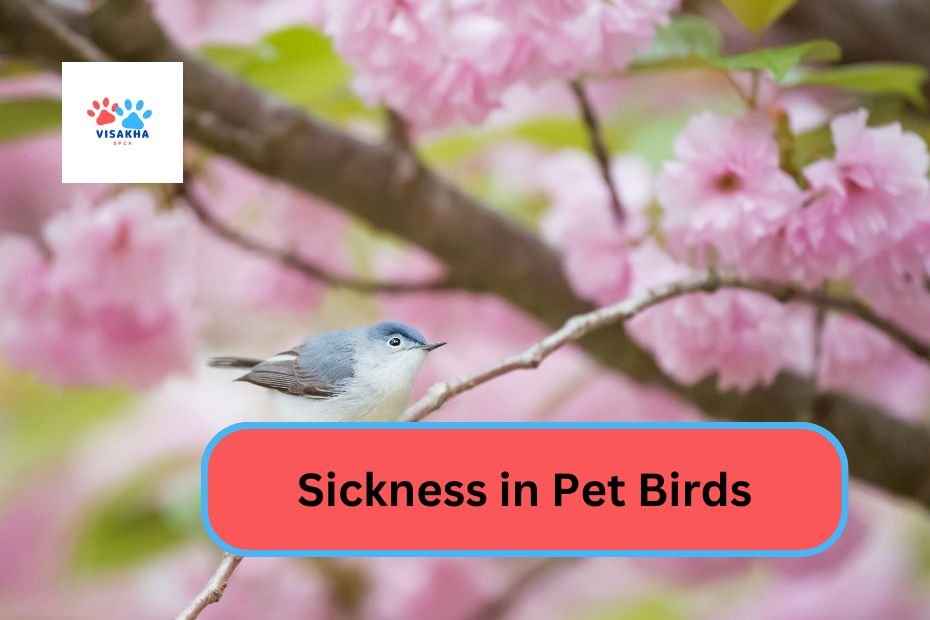Birds, like any pets, can fall ill from time to time, and their health can decline quickly due to their smaller size and unique physiology. Unfortunately, many birds are good at hiding signs of illness until it’s too late, making it essential for bird owners to recognize the early signs and act swiftly.
This guide will cover the common causes of illness in pet birds, symptoms to watch for, and general treatment options to ensure your feathered friend stays healthy.
Common Causes of Sickness in Pet Birds
Understanding the underlying causes of illness in birds can help prevent health problems and recognize the early stages of disease. Here are some common factors that contribute to illness in pet birds:
1. Improper Diet
Birds require a specific and well-balanced diet. Nutritional deficiencies, especially a lack of essential vitamins and minerals, can lead to various health issues, including weakness, feather plucking, and weakened immune systems. Seeds alone are not enough for most birds; they need a diet that includes fresh fruits, vegetables, and pellets.
2. Stress
Birds are highly sensitive creatures, and prolonged stress can weaken their immune systems, making them more susceptible to infections. Causes of stress can include a lack of social interaction, changes in their environment, loud noises, or improper handling.
3. Environmental Factors
An unsuitable living environment can significantly impact a bird’s health. Exposure to drafts, sudden temperature changes, or dirty cages can lead to respiratory issues, skin infections, and other ailments.
4. Infections
Birds are vulnerable to bacterial, viral, fungal, and parasitic infections. These infections can spread through contaminated water, food, or contact with other sick birds.
5. Toxins
Birds are extremely sensitive to toxic substances, and many common household items can be harmful to them. Smoke, chemical fumes, air fresheners, non-stick cookware (Teflon), and certain plants can cause respiratory problems and even death.
Symptoms of Sickness in Birds
Since birds are adept at hiding their symptoms, it’s important to monitor their behavior, appearance, and overall demeanor. Early intervention is crucial to prevent a minor issue from escalating into a life-threatening situation. Here are some common symptoms to watch for:
1. Changes in Appetite or Weight Loss
A noticeable decrease in appetite or sudden weight loss is a major red flag. Birds have high metabolisms, so even skipping a single meal can indicate a problem.
2. Fluffed-Up Feathers
While birds naturally puff up their feathers to stay warm, constantly fluffed-up feathers, especially when paired with lethargy, could be a sign that your bird is ill.
3. Lethargy or Weakness
Healthy birds are usually active and alert. If your bird seems unusually tired, weak, or inactive, it may be feeling unwell.
4. Labored Breathing or Open-Mouth Breathing
Birds with respiratory issues may breathe heavily, gasp for air, or breathe with their mouths open. Wheezing or sneezing can also indicate a respiratory infection.
5. Changes in Droppings
Bird droppings can provide clues to your bird’s health. Diarrhea, discolored droppings (especially yellow, black, or green), or a change in consistency can signal an underlying issue.
6. Discharge from the Eyes, Nose, or Beak
Any discharge from a bird’s eyes, nose, or beak is abnormal and may indicate a respiratory or sinus infection. Keep an eye out for watery, crusty, or discolored secretions.
7. Unusual Vocalization or Silence
If your normally chatty bird becomes silent or if you notice a change in their voice, it could be a sign that they are not feeling well. Birds with respiratory infections may also develop a raspy voice.
8. Feather Plucking or Dull, Ragged Feathers
Feather plucking, chewing, or excessively preening could be a response to stress, skin irritation, or illness. Dull, ragged feathers may also indicate a nutritional deficiency or illness.
9. Balance Issues or Head Tilting
Difficulty maintaining balance, frequent falls, or head tilting could indicate a neurological issue, inner ear infection, or injury.
Common Illnesses in Pet Birds
1. Psittacosis (Parrot Fever)
Psittacosis is a bacterial infection caused by Chlamydia psittaci, commonly affecting parrots, cockatiels, and parakeets. Symptoms include lethargy, respiratory distress, and diarrhea. This illness is zoonotic, meaning it can be transmitted to humans, so early detection and treatment are important.
2. Aspergillosis
Aspergillosis is a fungal infection that affects the respiratory system. It’s caused by the fungus Aspergillus, often found in moldy feed, bedding, or a poorly ventilated environment. Birds may exhibit symptoms like wheezing, coughing, and nasal discharge.
3. Proventricular Dilatation Disease (PDD)
PDD is a viral disease that affects a bird’s digestive system and nervous system. It leads to weight loss, regurgitation, and neurological symptoms like tremors or seizures.
4. Avian Influenza (Bird Flu)
Avian flu is a contagious viral infection that can be fatal to birds. Symptoms may include coughing, sneezing, swelling of the face, and a sudden drop in egg production. It’s important to isolate any sick birds to prevent the spread of the disease.
5. Egg Binding
Egg binding occurs when a female bird has difficulty passing an egg. It’s a serious condition that can lead to death if not treated immediately. Symptoms include straining, lethargy, and swelling around the abdomen.
6. Sour Crop (Crop Stasis)
Sour crop occurs when food is not properly digested and ferments in the crop, leading to infection. Birds with sour crop may have a swollen crop, regurgitate food, or display a sour odor from their beak.
Treatment for Sick Birds
If you suspect your bird is ill, it’s essential to consult an avian veterinarian immediately. Early intervention and proper treatment can make a significant difference in your bird’s recovery. Here are some general steps to take if you notice signs of illness:
1. Consult a Veterinarian
An avian vet will perform a thorough examination, diagnose the illness, and recommend appropriate treatments. This may include medications, dietary changes, or environmental adjustments.
2. Provide a Warm, Quiet Environment
Sick birds often benefit from a warm, stress-free environment. Consider using a heat lamp or placing your bird’s cage in a warm room away from drafts and noise.
3. Hydration and Nutrition
Ensure your bird stays hydrated and nourished. Sick birds may need to be hand-fed or encouraged to drink water. In some cases, special diets or supplements may be required.
4. Isolate Your Bird
If you have multiple birds, it’s important to isolate the sick bird to prevent the spread of disease. Clean and disinfect the bird’s cage, food dishes, and toys regularly.
5. Administer Medications as Prescribed
Follow your vet’s instructions carefully when administering medications. Birds have a fast metabolism, so timely treatment is essential.
Conclusion
Recognizing sickness in pet birds can be challenging, as they are skilled at hiding symptoms. However, by being vigilant and understanding the signs of illness—such as changes in appetite, lethargy, labored breathing, and unusual droppings—you can take swift action to ensure your bird receives the care it needs. With proper diet, a stress-free environment, and regular veterinary check-ups, many common bird illnesses can be prevented or treated successfully. When in doubt, always consult an avian veterinarian for guidance and support in keeping your bird healthy.

